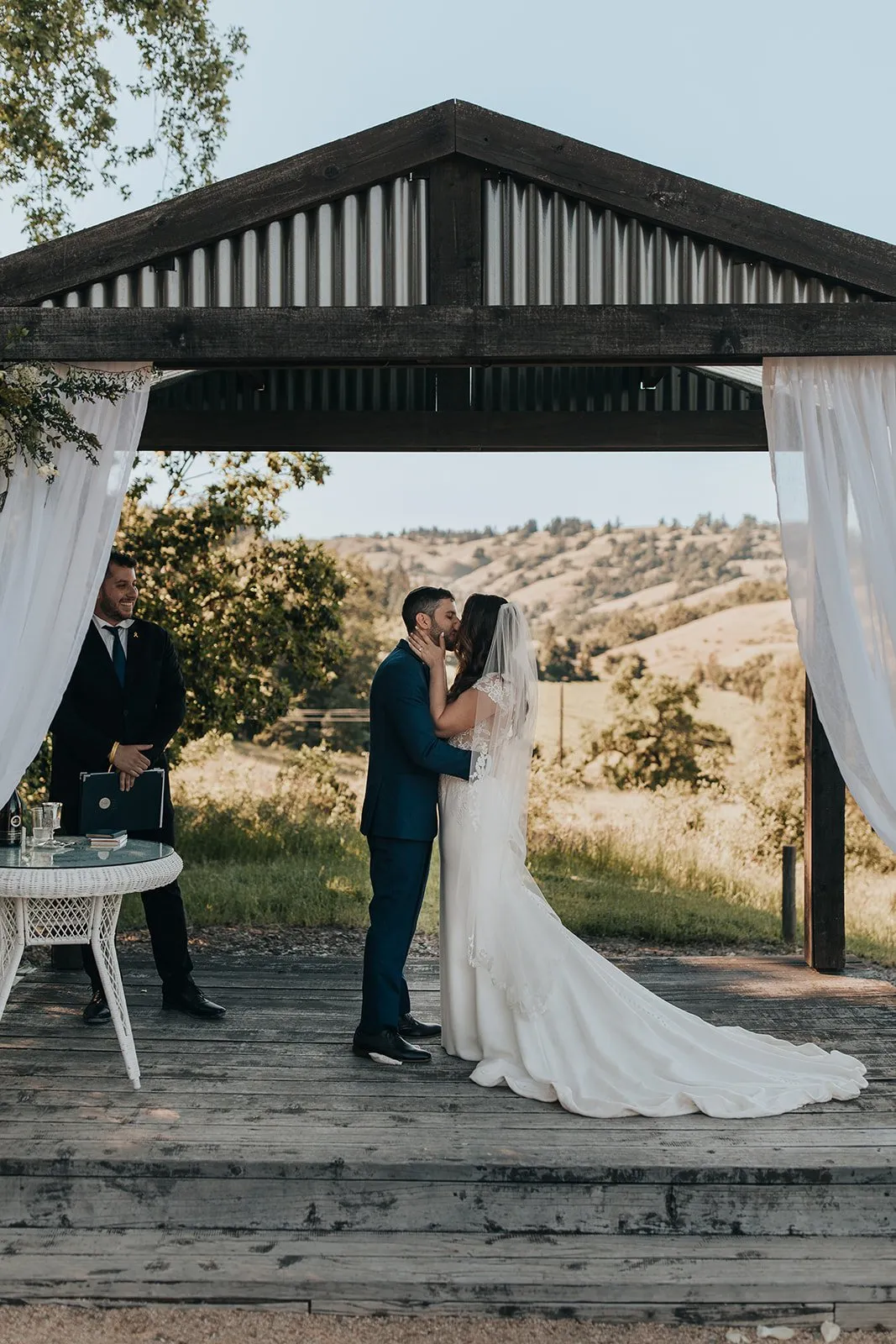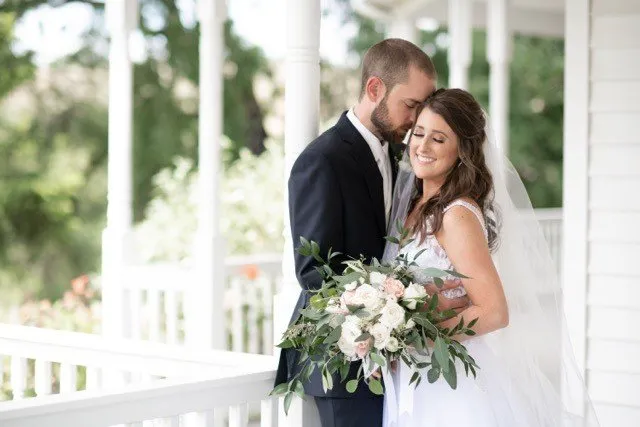For many individuals, the exchange of vows is the most anxiety-inducing aspect of their wedding. This pivotal moment, with all eyes on the couple, can be particularly stressful for several reasons:
Difficulty with public speaking
Preference for keeping the vows private between themselves and their partner
Fear of forgetting their vows
Concern that their vows may be misunderstood by family and friends
Anxiety about potentially freezing during the exchange

If you’re in the 75% majority or even the 10% that are genuinely terrified, fear not – there are several easy solutions to allow you concur your fears while being able to be relaxed and enjoy this most important and memorable tradition of exchanging your wedding vows.
While we’d all love to be able to memorize what we want to say, there are very few people that can pull it off. Most vow exchanges are read from a piece of paper or even a small vow book – this is perfectly acceptable and quite common. It may be helpful if your officiant keeps each of your vows (sheet of paper or vow book) and hand it to each of you when it’s your turn. Pro tip: don’t spoil the moment by having your vows on your phone – it cheapens the moment. Having your vows written down ensures that you will be able to say exactly what you want to say and won’t forget any important points in the heat of the moment. You can also choose to read your vows together with your partner, alternating lines or paragraphs. This shared experience can make the moment feel more intimate and less daunting.
Exchanging personal vows in private– perhaps during a “first look” before the ceremony – can be a wonderful way to share your deepest feelings without the pressure of an audience. This intimate moment allows you to speak freely and openly, creating a special memory just for the two of you. You can then say traditional vows during the public ceremony, which can be simpler and less nerve-wracking. This approach balances the need for personal expression with the comfort of a more traditional format.

Whether your officiant is a professional or a friend, they’re probably part of the 10% that are comfortable and enjoy speaking in front of people. You can take advantage of their skills by writing your vows and having the officiant read them which can take a lot of pressure off you. This way, your personal and meaningful words are still conveyed, but you don’t have to worry about delivering them yourself. Having your officiant lead you through your vows by repeating after them can significantly reduce anxiety. This method breaks down your vows into manageable segments, making it easier to focus on each part without feeling overwhelmed. It also ensures that you don’t have to memorize your vows, which can be a major source of stress. This approach can create a sense of rhythm and flow, helping you stay calm and composed.
Keeping your vows short and sweet can make the task of speaking in front of others more manageable. Focus on a few key promises or sentiments that encapsulate your feelings and commitment. For example, you might choose to highlight three main points: why you love your partner, a promise for the future, and a personal anecdote or memory. This structure can help you stay focused and concise, reducing the likelihood of getting overwhelmed. Remember, it’s the sincerity of your words that matters most, not the length.
We’d say this is somewhat of a last resort, where you would pre-record your vows and at the appropriate time your DJ would play back your words. If you’re going to go down this path, you might as well go “all in,” right? So maybe get some voice-over impersonators to read the vows - think celebrities or personalities such as James Earl Jones (Darth Vader), Sean Connery (James Bond), Tom Brokaw, Judi Dench, or Queen Elizabeth. You could even add background music or even special effects to your vows, which could add a fun element and enhance the emotional impact. The benefit is this method allows you to take your time and record your vows in a comfortable setting, free from the pressure of an audience. You can do multiple takes until you’re happy with the result. On the wedding day, your recording can be played during the ceremony, ensuring your heartfelt words are shared without the stress of public speaking. Yup, this could get “cheesy” very quickly, but it also could be very original and add some levity to your celebration and wedding vows.
Assuming you want everyone to hear your vows, it’s important to understand a few things: first, you will be speaking to your partner and most likely won’t be trying to project your voice to all your guests. Second, you will be facing your partner, so your voices won’t be directed to your guests, but to each other (as they should be). The best way to make sure that everyone can hear your vows – and your guests definitely do – is to make sure that both you and your partner are properly mic’d. Using a microphone will help ensure that your vows are heard clearly without the need to project your voice loudly. This can be particularly helpful if you’re nervous about speaking up or if you have a soft voice. A microphone can amplify your words, allowing you to speak at a comfortable volume. Make sure to test the microphone beforehand to ensure it’s working properly and that you’re comfortable using it. To further alleviate any stress with using microphones, our Arbor ceremony site has built in microphones, so as soon as you step into the arbor, your guests will be able to hear the officiants words and your vows without having to worry about mic placement.
Practicing your vows multiple times before the wedding day can build your confidence and reduce anxiety. The more familiar you are with your vows, the more comfortable you’ll feel when it’s time to say them. Practice in front of a mirror to get used to seeing yourself speak, or rehearse with a trusted friend or family member who can provide feedback and support. Consider recording yourself to identify any areas where you might need to slow down or enunciate more clearly. Don’t pressure yourself to thinking you have to memorize the vows – while that’s ideal, it’s very difficult to do, and reading them is perfectly acceptable.
Consider alternative formats for your vows that feel more comfortable and authentic to you. This could be a poem, a letter, or even a song. Choose a format that allows you to express your feelings in a way that feels natural and genuine. For example, if you’re a writer, you might feel more comfortable writing a heartfelt letter to your partner. If you’re musically inclined, you could compose a song that captures your emotions.
During the ceremony, try to focus on your partner rather than the audience. Look into their eyes and speak directly to them. This can help you feel more connected and less aware of the crowd. Remember, your vows are a personal declaration of your love and commitment, and the most important person to hear them is your partner. Focusing on this connection can help ground you and reduce anxiety.
Using mindfulness techniques such as deep breathing or visualization can help calm your nerves before speaking. Take a few deep breaths to center yourself and reduce tension. Visualize a positive outcome, imagining yourself speaking confidently and clearly. These techniques can help shift your focus away from anxiety and towards a sense of calm and control.
Incorporating humor into your vows can lighten the mood and make you feel more at ease. A light-hearted moment can break the tension and make the experience more enjoyable for both you and your audience. Share a funny anecdote or a playful promise that reflects your relationship. Just make sure the humor feels natural and appropriate for the occasion.
Finally, remember to enjoy the moment. Your wedding day is a celebration of your love and commitment. Take time to savor the special moments, from walking down the aisle to your first dance. Be present and soak in the joy and love surrounding you. These are the memories you’ll cherish for a lifetime.
By exploring these expanded tips and alternative methods, you can find a way to express your love and commitment that feels right for you and make your wedding more memorable and fun. Remember, the most important thing is the sincerity of your words, not the way they are delivered. Best wishes for your wedding day, and may it be filled with love, joy, and beautiful memories!
Enjoy a relaxed weekend wedding at The Highlands Estate, a beautiful and private barn and vineyard weekend wedding destination. Create memories of a lifetime with the on-site lodging accommodations for up to twenty-two of your closest friends and family. Celebrate your wedding day with up to 200 guests while experiencing the spectacular landscape, situated on over 21 country acres, providing a multitude of vistas and photo opportunities. Having hosted couples originating from all over the United States, Europe, Asia, Africa and Australia, The Highlands Estate is a true international destination and is conveniently located in the heart of Northern California wine country, just 30 minutes from Healdsburg and the famous Dry Creek Valley.
The Highlands Estate (707) 894-9500 © 2014-2025, The Highlands Estate All Rights Reserved